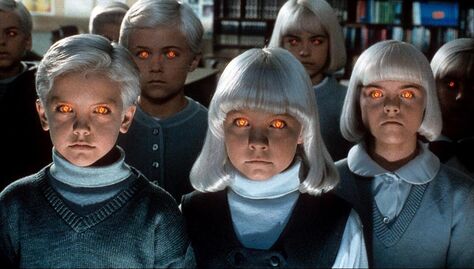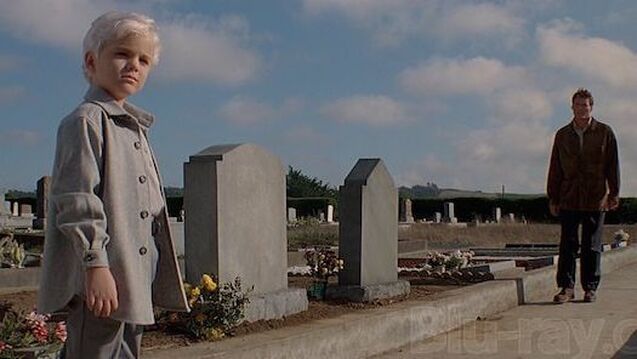Quarantine with Carpenter: The Lesson of Empathy in 'Village of the Damned' 25 Years Later4/28/2020  I took something of a poll to see how people feel about John Carpenter’s 1995 Village of the Damned remake before sitting down to write this and the results were…less than mixed. Carpenter may be one of horror’s masters, but people aren’t shy about letting you know when he does something they don’t like... ...Now, of course, everyone is entitled to their thoughts about it, and there will sometimes just be things great people do that others don’t like. No one is perfect, and no one is to everyone’s taste. But for me, re-watching it now, in a time very much about unity and empathy as the equivalent to survival, I got a lot more out of it than I expected. For the unfamiliar, Village of the Damned, written by Carpenter and David Himmelstein and based on the novel The Midwich Cuckoos by John Wyndham, is about a county-wide blackout that results in hours of lost time and several simultaneous yet unexplainable pregnancies, and the otherworldly children that result. Federal doctors are called in to study the mothers and their babies and to try and explain the blackout. All the children are born on the same day, at the same time, and more or less look the same. White hair, occasionally glowing eyes that lead adults to their death, you know, the usual cherubic baby stuff. The children, obviously, are not of this world. They’re emotionless and quick to anger all at once, able to read the minds of anyone around them, and connected to each other completely. If one feels pain, they all immediately want and seek revenge for the wrong. If you’re thinking something against them, they’re gonna know about it. And they can make you do whatever they want. But not all the children are quite as they seem. One of them, David (Thomas Dekker) learns about empathy, and begins to develop emotions the others don’t have: love, sadness, discomfort at the pain of others. This is more than a story about empathy. This story is about empathy and love through the lens of one of the most intimate and complex bonds humans are capable of understanding: the bond of a mother and her child. One of the mothers is a virgin before the blackout, and her baby, on delivery day, is stillborn. This baby is meant to be young David’s “partner”, so it is her he connects with the deepest. From her, he learns what it means to feel empathy for this loss neither of them truly have words to express. At one year old the de facto leader of this band of alien children, Mara (Lindsey Haun), uses her mind powers to first get her mother to stick her hand in a pot of boiling water, and then, when stopped, jump off the cliff in the back of their house to her death. These two women are the only two mothers to die. Both ostensibly by their own hand. One by choice, the other by compulsion. Two sides of a pregnancy-related phenomenon hardly ever spoken about — post-partum depression. But Carpenter is interested in more than just a surface-level exploration of the effects of this experience. He carries the thread all the way through how the resulting loss affects those left behind. Mara’s father, Alan (Christopher Reeve), is lost and angry after the death of his wife. Because David can read minds, he knows exactly what the mother of his lost partner is going to do, and though he doesn’t have the words to express it, he feels the loss and pain so deeply it changes him fundamentally. He can’t stop thinking about “the one who died” and how her death means he’s missing out on something. A piece of him, as far as the group dynamics go, is missing. He is continuously set apart, even when included. Mara even tells him that his being alone means he has less value to their group. They’re all about survival, which means being partnered and procreating, no emotions about it. Kill or be killed is the name of the game, and when you don’t want either of those options you become the outcast. The current state of the world gives this movie an additional and entirely unique filter of analysis that likely wouldn’t be there otherwise. Here’s the deal: we’re all in quarantine. We’re facing a threat unlike anything we’ve ever experienced that’s invading our homes and taking people we love away from us virtually without warning. The only way we’re going to make it out of this the fastest is by remembering the most important tool at our disposal — empathy for people. People we love and people we may never know. Caring about each other is, if we let it be, the most powerful method of survival and the most rebellious act in the face of this thing that wants to tell us who lives and who dies. The children come onto the scene in the shape of a dark, formless cloud that travels over certain houses and knocks an entire town literally and inexplicably flat on its back. At its beginning no doctor can explain how or why it happened. There’s monetary compensation in exchange for being allowed to study the affected families. There’s even coordinated military response in other affected areas! The range of responses from the town is pretty realistic, too, if you think about it. The doctors just want to learn more about the phenomenon so they can better understand and protect as many people as possible. The majority of the town wants to do what’s best. A few individuals seem predominantly interested in maximizing their financial gain. And one truly rogue group wants to use force, that ultimately results in at least one gruesome death that likely could have been avoided. Sometimes, art imitates life in unexpected ways. I didn’t expect to see such parallels in a movie about alien children bent on survival-by-destruction, but there they were. It’s still a monumental event that, apparently, affects the world in its entirety all at once. There are only so many ways people respond to disaster, no matter the scale, and Carpenter seems to have been interested in exploring the full range. Happy 25th, Village! Welcome to quarantine. By Katelyn Nelson
0 Comments
Leave a Reply. |
Archives
March 2023
|

 RSS Feed
RSS Feed